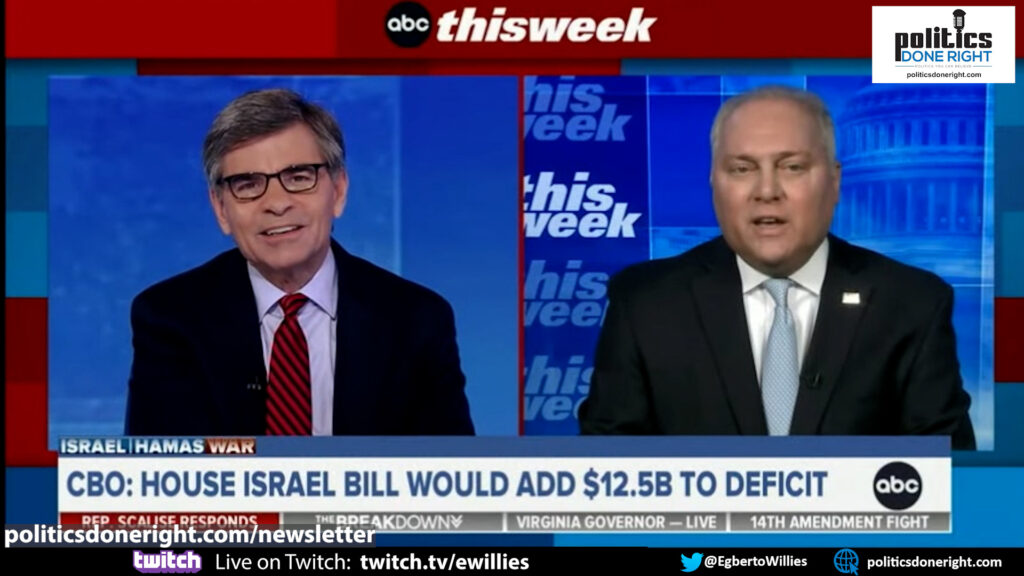Rep. Steve Scalise made a fool of himself on This Week with George Stephanopoulos by disputing a CBO report that said defunding new IRS agents sanctioned to catch rich tax cheats would increase the deficit while agreeing with them on who would pay more taxes.
Stephanopoulos slams Scalise for CBO doubletalk.
In a recent airing of ABC’s “This Week,” George Stephanopoulos engaged in a rigorous dialogue with Congressman Steve Scalise, scrutinizing the apparent duplicity within the GOP’s rhetoric regarding fiscal policies. The discussion centered on the nuanced interpretations and selective endorsements of the Congressional Budget Office (CBO) reports by the Republican party, especially when juxtaposing financial aid to Israel against the hiring of IRS agents to combat tax fraud.
In the video clip:
- George Stephanopoulos confronted Congressman Steve Scalise on “This Week” over GOP inconsistencies in discussing the Congressional Budget Office’s (CBO) analyses, particularly concerning funding for Israel and IRS enforcement cuts.
- Scalise was criticized for selectively citing the CBO to support his arguments, emphasizing their claim that hiring IRS agents would unfairly tax the middle class while dismissing their assertion that not hiring these agents would increase the deficit.
- The debate highlighted a Republican-introduced bill that ties military aid to Israel with reductions in IRS enforcement, aimed at preventing tax fraud by potentially increasing taxes for those earning under $400,000, which contradicts President Biden’s pledge.
- The discussion pointed out the GOP’s “doublespeak,” as they use the CBO’s findings to their advantage when it aligns with their narrative but discredit the same source when it does not.
- Stephanopoulos and the program emphasized the importance of cutting through political rhetoric. They urged viewers to support their platform in spreading a progressive message that resonates with most Americans.
At the crux of the conversation was the Republican-introduced bill that ostensibly sought to address two key issues: providing military aid to Israel and managing national debt by cutting IRS enforcement—a move that some argue primarily targets wealthier individuals evading taxes. Scalise defended the bill, insisting it solved pressing national concerns, though Stephanopoulos quickly noted the inconsistencies in this argument. The CBO had clearly stated that such reductions in IRS enforcement could lead to an increase in the deficit. Moreover, they estimated a burden of $4 billion in new taxes on families making less than $400,000 per year, starkly contrasting with President Biden’s commitment not to raise taxes on this demographic.
Stephanopoulos missed the opportunity to give context to Scalise’s argument that those making $400,000 or less would pay more taxes. If one paid less taxes because of fraud, that does not go against the president’s promise, as the lower taxes would have been ill-gained.
The dialogue underscored the selective validity that Scalise, and by extension, the GOP, assigned to the CBO’s findings. When the CBO’s analysis favored their narrative—such as the claim that hiring IRS agents would impose undue taxes on the middle class—the report was held in high regard. Conversely, when the CBO’s findings did not align with their fiscal policy objectives—namely, the projection of an increased deficit resulting from the lack of IRS enforcement—their accuracy and reliability were summarily dismissed.
This selective affirmation by Congressman Scalise highlights a broader strategy within political communication, commonly called “cherry-picking.” This tactic involves highlighting evidence that supports a specific position while ignoring data that may contradict it. Such an approach to policy discourse not only undermines the integrity of the debate but also questions the foundational principles of transparency and accountability that are essential in a functioning democracy.
Stephanopoulos’s interrogation of Scalise on “This Week” is a vital reminder of the media’s role in ensuring that political narratives are subjected to fact-checking and critical analysis. The program’s effort to deconstruct political news and provide a comprehensible format to the public is an endeavor to uphold the ethos of informed citizenship. It’s an exercise in distilling the truth from political rhetoric, which, as the interaction between Stephanopoulos and Scalise revealed, can sometimes be a convoluted mesh of contradictory statements and ideological positioning. Too often, the mainstream would let hacks like Steve Scalise get away with misinformation, doublespeak, and smoke & mirrors.
The exchange between Stephanopoulos and Scalise is emblematic of the challenges faced in today’s political landscape, where partisan interests often overshadow facts. It is a stark reminder of the need for vigilance in political discussions and the importance of holding our representatives accountable for the consistency and credibility of their arguments. Only through such rigorous discourse can we hope to foster policies that are equitable and reflective of the people’s will.
Viewers are encouraged to subscribe and join the conversation for more insightful commentary and to support progressive messages. Together, we can populate the internet with progressive messages that represent the true aspirations of most Americans.

